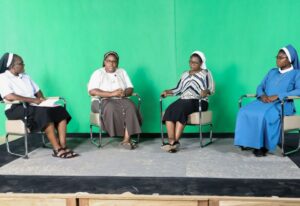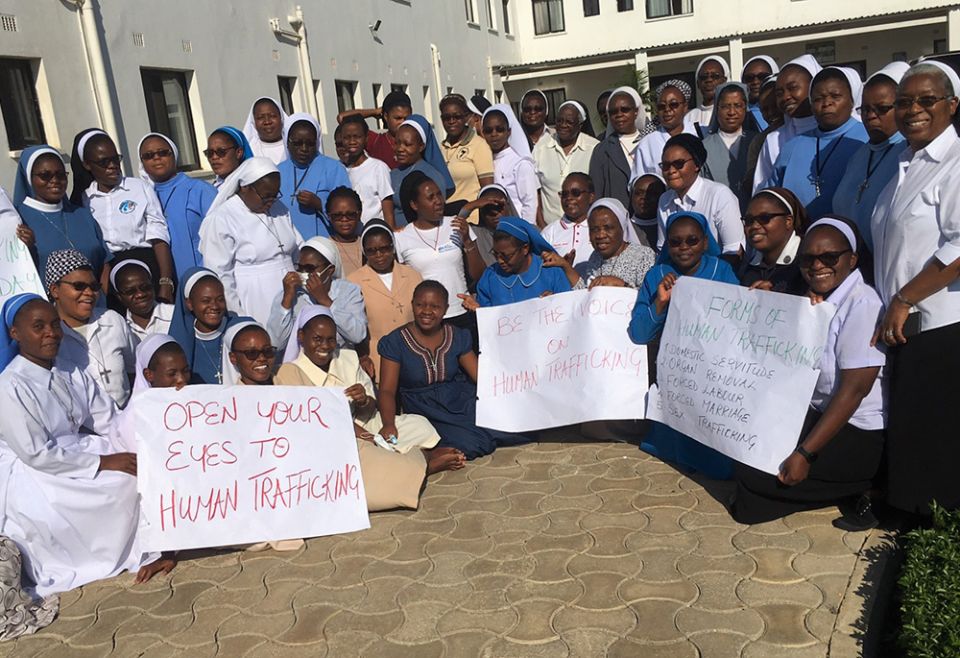Over 62 Catholic nuns from across Zambia, representing 45 religious communities, gathered last fall in Makeni, Lusaka, at the City of Hope Retreat Center in Zambia to reflect on “Religious Vocation, Church, Society, and Prophetic Witnessing.”
This workshop was part of the Africa Faith and Justice Network (or AFJN) Washington, D.C. Women’s Empowerment Project, aimed at helping sisters see how their religious vocation and their faith call them to be justice advocates.
The workshop was also intended to help the sisters reflect on the importance of being the voice of those who are not often heard — and those in our societies who, as Pope Francis puts it, are often neglected and consigned to the margins of society — mobilizing the energies of these sisters for engagement in the public square, through advocacy rooted in Catholic principles and values.

The sisters gathered on Nov. 13, hearing a social analysis from the African context, the biblical foundation for advocacy, and advocacy steps and strategies. They also reflected on issues affecting Zambia — human trafficking, the environment, foreign nations including China, multinational corporations, exploitative activities, impact of investments, land acquisition, unemployment, and challenges faced by families — and ways these violate the rights and dignity of the human person created in God’s image.
Our interaction with the sisters during the discussion showed that many of them were not conversant with the issue of human trafficking and are not active in the global effort to end this evil, so the empowerment workshop made human trafficking issue a major focus of the workshop. One of the sisters said that “human trafficking is real in Zambia but all along I thought it is a thing which happens in other countries, especially western countries” — evidencing a knowledge gap on human trafficking issues among the sisters.
The analysis of human trafficking study that was commissioned by Africa Faith and Justice Network before the workshop was presented to the sisters by a researcher; this exposed the sisters to the concept of human trafficking in general and in Zambia in particular. It opened their eyes to the evil of human trafficking and brought them up to date on the current situation of human trafficking and the exploitation of human persons in the country.
Zambia acceded to the Palermo Protocol to prevent, suppress and punish trafficking in persons in 2005, yet the country remains the source, transit and destination country for men, women and children trafficked for the purposes of forced labor and sexual exploitation.
Just as in other parts of the world, an intricate network of actors — including transporters, border control agents, acquaintances, relatives and workers in massage parlors, casinos, brothels, employment companies and employers of domestic servants — continue to facilitate human trafficking in Zambia.

These trafficking rings exploit Zambians and people from Asia and other African countries in the mining, construction and manufacturing industries, casinos and massage parlors. Unfortunately, there was no known public government forum to educate the masses and create public awareness about human trafficking to help the masses protect themselves.
Conscious that human trafficking violates the dignity of the person and affects most aspects of Zambian society — families, children, students, domestic and migrant workers, young people searching for a better life, and young people in the hospitality industry — and saddened by the general complexity in both the government and general public, the sisters were convinced that this is the time their prophetic voice is needed in the public square to break the silence that sustains the evils of human trafficking in their society.
This realization and conviction moved the sisters to public action to end the silence around human trafficking. During the oral evaluation of the workshop, one of the sisters stated that: “As prophetic women, [we] have a duty and obligation to speak out on issues that affect poor people in our midst because if [we] don’t, then nobody else will do it.”
Equipped with knowledge and advocacy skills, the sisters, as prophets, stood up in public against human trafficking. They spoke up in public against the structures and situations that perpetuate and sustain human trafficking and other forms of injustice in the world and in their country. The last day of the workshop was spent holding a public awareness campaign targeted at educating the masses on human trafficking and pushing the government to live up to their responsibility. The sisters hosted radio talk shows and panel discussions on human trafficking on popular Radio Maria Yatsani 99.3 FM and Loyola Television Zambia. They also used these resources to hold press conferences on human trafficking issues.

The sisters also engaged the government, paying advocacy visits to four government ministries — immigration, home affairs, the vice president and the chief justice. They also visited the director of the international bus station in Lusaka because this bus station was identified as the continental hub and transit center for human trafficking. The sisters demanded that government efforts to combat human trafficking in the country be intensified, urging the government to enhance its efforts by mobilizing the appropriate government agencies to work collaboratively to:
- Protect the lives and dignity of the people living in the country who are objectified and exploited through human trafficking;
- Set up a mechanism to protect migrant workers within Zambian borders who are abused and exploited, as many of them have their passports and national identity documents seized by their domestic employers;
- Establish a mechanism for creating awareness accessible to the wider public, especially those in the rural areas where many of the victims are taken;
- Create training programs for law enforcement and immigration officers and the members of the judiciary on human trafficking;
- Establish a pool of interpreters to facilitate communication with the victims of human trafficking;
- Facilitate an educational environment that promotes skills training for young people so they can be productive and self-reliant individuals who are able to contribute to the development of our society;
- Establish more places of safety for victims’ protection;
- Strengthen collaboration with neighboring countries to tighten security at border points;
- Strengthen the training of police, immigration and security agencies in human trafficking.
- As the sisters tasked the government to protect both Zambians and all that come through its border through trafficking, they pledged to continue to work to promote the common good as individuals and as a group, tackling this evil of human trafficking affecting their country. They pledged to organize awareness seminars in their communities and institutions under their care, to provide counseling to rescued victims, and to find ways to reintegrate victims as productive members of society.
- At the end of the workshop on Nov. 17, the AFJN team was happy to see that the sisters returned home feeling empowered to address issues of injustice in their communities — especially as perpetuated by human traffickers. One of the sisters promised, “I will practically find out how much human trafficking is going on in the Copperbeltto see how I can be a voice to the voiceless there.”
- We were grateful that Loyola TV promised to give the sisters another opportunity in December to continue to educate the masses on human trafficking and other issues of great concern to the sisters. And we are glad that Zambia has joined the ranks of the other countrieswhere we have offered these workshops!
Note: Eucharia Madueke is a Sister of Notre Dame de Namur from Nigeria. With an academic background in education, religion, development and public policy, she has taught on the secondary and university levels in Nigeria and the United States. She has led many workshops in Africa in grassroots organizing and advocacy centered around Catholic social teaching. She served as provincial of the Sisters of Notre Dame de Namur, Nigerian Province. Presently she is the women’s empowerment project coordinator for the Africa Faith and Justice Network, a religious nonprofit organization that focuses on US-Africa relations.



